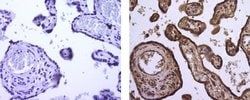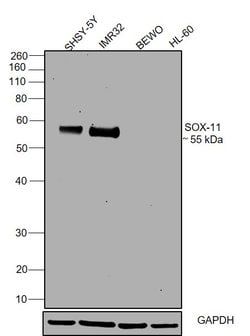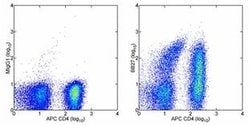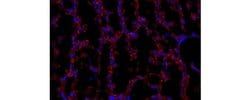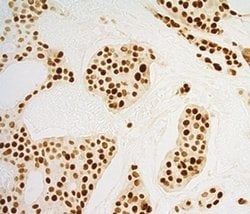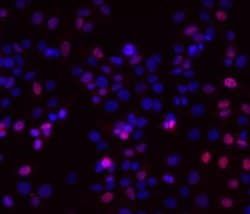Angiogenin Monoclonal Antibody (26-2F), eBioscience™, Invitrogen™
Manufacturer: Fischer Scientific
Select a Size
| Pack Size | SKU | Availability | Price |
|---|---|---|---|
| Each of 1 | 14-976-237-Each-of-1 | In Stock | ₹ 1,22,108.00 |
14-976-237 - Each of 1
In Stock
Quantity
1
Base Price: ₹ 1,22,108.00
GST (18%): ₹ 21,979.44
Total Price: ₹ 1,44,087.44
Antigen
Angiogenin
Classification
Monoclonal
Concentration
0.5 mg/mL
Formulation
PBS with 0.09% sodium azide; pH 7.2
Gene Accession No.
P03950
Gene Symbols
ANG
Purification Method
Affinity chromatography
Regulatory Status
RUO
Gene ID (Entrez)
283
Content And Storage
4° C
Form
Liquid
Applications
ELISA, Functional Assay, Immunocytochemistry, Immunohistochemistry (Frozen), Immunohistochemistry (Paraffin), Immunoprecipitation, Neutralization
Clone
26-2F
Conjugate
Unconjugated
Gene
ANG
Gene Alias
AI385586; ALS9; ANG; Ang1; Angiogenin; angiogenin ribonuclease 1; angiogenin, ribonuclease A family, member 1; angiogenin, ribonuclease, RNase A family, 5; angiogenin-1; epididymis luminal protein 168; HEL168; MGC22466; MGC71966; RAA1; Ribonuclease 5; ribonuclease A A1; ribonuclease A family member 5; RNase 5; RNASE4; RNASE5; Rnase5a
Host Species
Mouse
Quantity
2 mg
Primary or Secondary
Primary
Target Species
Human
Product Type
Antibody
Isotype
IgG1 κ
Description
- The MAb 26-2F recognizes human angiogenin
- Angiogenin is a secreted ribonuclease (RNASE)-family member and is important for the formation of new blood vessels as well as the stimulation of cell proliferation and survival
- Cellular stress signals direct angiogenin to stress granules where angiogenin functions by hydrolyzing cellular tRNA resulting in modulation of protein translation and promotion of cell survival
- Cytoplasmic angiogenin can bind to actin, forming complexes that activate protease cascades which can degrade laminin and fibronectin allowing endothelial cells to penetrate the basement membrane and migrate
- In cancer cells, growth signals direct angiogenin translocation to the nucleus where binding of DNA promotor regions stimulates rRNA transcription resulting in a downstream increase in protein synthesis driving cell growth and survival
- Angiogenin is upregulated in multiple cancers including breast, prostate, cervical, colorectal, lymphoma, and melanoma
- During development and in adulthood, angiogenin is highly expressed in the spinal cord and contributes to motor neuron survival
- Angiogenin is important for neuronal survival and is depleted in neurodegenerative diseases such as amyotrophic lateral sclerosis (ALS) and Parkinson's disease
- This 26-2F antibody is reported to have both in vivo and in vitro neutralizing activity to angiogenin
- Angiogenin (ANG or ANG I) is important for the process of neovascularization and formation of new blood vessels
- ANG is similar to pancreatic ribonuclease A and functions as a tRNA-specific ribonuclease that abolishes protein synthesis by specifically hydrolyzing cellular tRNAs
- It interacts with endothelial cell-surface actin and may cause changes in the cell cytoskeleton
- ANG is thought to be involved in the development of solid tumors and its antagonists are capable of inhibiting tumor growth
- Defects in ANG are the cause of susceptibility to amyotrophic lateral sclerosis type 9 (ALS9)
- Angiogenin is a genetic link between ALS and PD.
